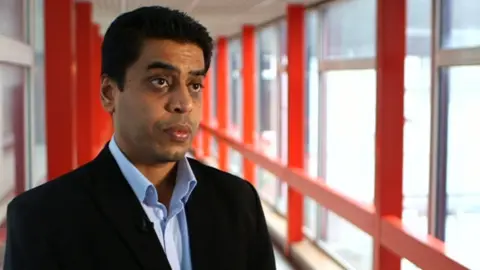Coronavirus in Wales: Questions and answers
The first case of coronavirus in Wales has been confirmed.
The patient, who is believed to be from the Swansea area, recently returned from northern Italy, where the virus was contracted.
Wales' chief medical officer, Dr Frank Atherton, said more cases were "inevitable".
Health Minister Vaughan Gething told BBC Wales they did not want to panic people and were asking them to go about their business.
"We're at a stage where we're looking to identify and contain coronavirus," he said. "That's still the position we're at and we still can't be certain about what the future will bring."
"I don't think it's a sensible thing for any part of the government to paint the most worrying scenario and ask people to prepare for that."
Dr Giri Shanka, from Public Health Wales (PHW) told BBC Wales' health correspondent Owain Clarke what happens now.
Does this mark a defining moment in how we should respond to the coronavirus?
The number of cases reported across various other countries in the world outside China has had a significant increase and, of course, and here in the UK there is evidence this outbreak is spreading.
What has PHW been doing since the case was identified?
Our primary responsibility is to inform the individual that their test has come back positive and which is what we do first.
We explain to them what that means and what the next course of action is in terms of their care. Our priority, without losing any time, is to transfer that individual to a specialist infectious diseases unit where they can receive the best care.
The second thing is to identify contacts of this individual. By that what we mean is we ask for a detailed account from that individual of where they have been, what they did, who did they meet with, how long did they spend.
Using that information we draw up a list of individuals who we're interested in speaking to to find out what is their current state. All of this has one primary goal which is to find out has the infection been passed to anybody else.

When will you know who the patient has been in contact with?
PHW is working around the clock to ascertain that information.
We've got a very good understanding of this particular individual's movement, we've got a very comprehensive list of individuals who we need to speak to and those individuals are being spoken to.
Are we talking about people who have spent a period of time with this person rather than being in a pub or a shop with them?
Absolutely. We have very, very robust protocols of defining contact, who qualifies as a contact and based on that level of contact, the duration of exposure and the type of exposure.
We categorise the contacts into different levels of risk assessment and we follow them up through the stringent protocols.

What are the next steps in terms of the Welsh response?
We should clearly expect to see more cases in Wales.
We need to mobilise more people to undertake contact tracing, making sure the hospitals are having enough trained staff and making sure that the healthcare staff are generally well protected.
Public Health Wales is updating its advice in a statement, daily at 1500 GMT.
How dangerous is the virus?
We can look at it in two ways. In terms of how easily it spreads from one person, if that's one parameter that we're looking at, then yes, there is evidence to suggest that this virus is spread from person to person.
But in terms of is it causing serious disease and that's a definition of dangerous then that is not the case of what we are seeing.
The overwhelming majority of the individuals who get the infection, over 80% of them, have a milder form of illness.
How does it compare to flu?
It's difficult to make a direct comparison between flu and coronavirus.
Although the presenting symptoms might be the same, in terms of the mortality for coronavirus in terms of what we know at this time it's roughly between 2 and 2.5%.
That's not a number that's comfortable with us as a public health group. We would like that to be significantly less.
The other important thing we have to remember is as a population we have never been exposed to this virus, there is no previous built immunity to this disease.
Sometimes people's immune response reacts differently to new viruses and that's something we need to be watching out for.

What should I do?
The best advice we would give is to avoid getting exposed to the virus.
Make sensible travel plans and follow the travel advice that's been provided by the Foreign Office.
Equally it may sound simple but it's the most important action is to ensure good hygiene.
This has been echoed by Dr Dai Lloyd, chairman of the Welsh assembly's health committee, who urged people to be "a bit obsessive about hygiene, frequently washing our hands with soap and water and self-isolating obsessively as well".
